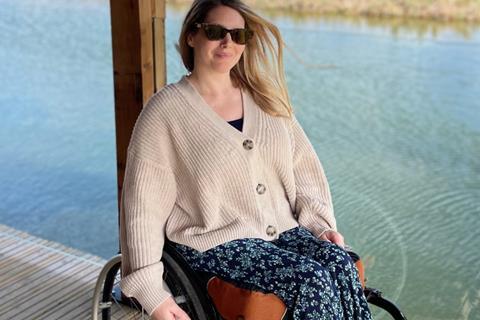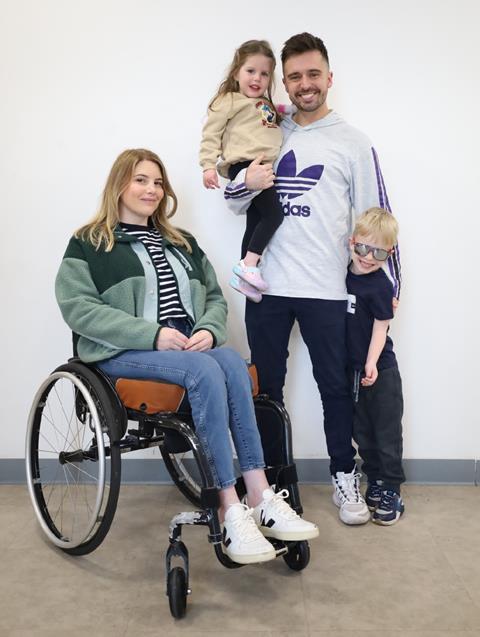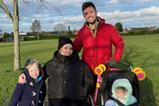At the age of 13 Jade Reynolds was diagnosed with a debilitating disease. She tells her story, and explains how she has managed to stay strong in her faith

You know when you run so fast you almost feel like you don’t have control over your own legs? As if, at any second, they may even take over and run past you? That doesn’t continue into adulthood does it?
But with kids it almost seems to be the default. It’s certainly how I always ran to the park with my sister, my dad walking behind telling us to slow down. I loved that feeling! And that’s how I ran that day too, unaware that it would be the last time I would ever have that experience.
On 13 May 2003, two weeks before my 13th birthday, my whole life was radically and irreversibly changed.
The moment my body stopped working
It was early evening, but still light out. We’d been at the park for about half an hour when my dad said we had to go. I was on a swing at the time, so I jumped off and started to head over to my dad but weirdly, with each step, I could feel my legs getting weaker and weaker. It’s hard to describe, but it felt as if the power was draining from them.
Exhausted, I lay down on the grass, my thighs aching with pins and needles. It felt kind of like when you sit on your foot and it falls asleep, but this was much more intense, as if someone was sat on my legs and I was pinned down, barely able to move them. They felt so heavy. Similarly, I was no longer able to coordinate or control them very well.
The grass was wet and so my dad said frustratedly: “Come on Jade! Get up! Stop messing around!” I just about managed to haul myself up, but I knew that my legs weren’t going to support me for very long. I saw a bench a few metres away and barely managed to stumble over to it. I sat down and, no matter how hard I tried, I couldn’t manage to get back up again. I was so confused.
Understandably concerned, my dad carried me all the way home, and then drove me straight to hospital. Once there, they did numerous tests but they couldn’t figure out what was wrong. All they knew was that I’d lost all movement and the majority of feeling in the lower half of my body.
They admitted me into hospital where I stayed for three months until they were able to diagnose me with acute transverse myelitis. Classified as an auto-immune disease, it’s so rare that they still don’t know what causes it.
Basically the coating of my spinal cord (myelin) was damaged, a bit like when the plastic cover on the wire of your phone charger frays. Effectively, I’d short-circuited.

So how did I cope? This is a question I was asked a lot at the time and a question I continue to get today. One of the biggest challenges wasn’t the mobility, but the uncertainty. Up until that point, the most traumatic thing that had happened to me was my guinea pig dying, but now I knew truly bad things happened and that was scary at times.
When I felt that fear, consoling me in the way that you would usually console a worried child – with phrases like, “don’t be silly, that’s not going to happen”, were meaningless.
Because I knew first-hand sometimes bizarre and painful things do happen. Being a child, I’d usually turn to the adults in my life when I had struggles, but my parents and even the doctors could do nothing to fix this problem. Any illusions I had over being in control of my own life were shattered.
Due to the randomness of my injury, Christians and non-Christians alike would regularly ask me: “Why do you think God let this happen to you?” My response was always: “Well, why not me?”. In John’s Gospel, Jesus himself tells us openly: “In this world you will have trouble” (John 16:33).
Rather than “trouble” being a sign of God’s absence in our lives, or worse, him breaking his promises to us, it appears to be a promise. As Christians, I believe a much-overlooked part of our calling is to suffer well.
Paul taught us that we can have joy in all circumstances (see Philippians 4 and 1 Thessalonians 5:16-18), secure in the knowledge that despite the “troubles” we endure, we can “take heart because he has overcome the world” (John 16:33).
Not only is that a promise for the future, but a promise that we can thrive in the present – even in our suffering. If we can only follow Jesus when life is good, have we really been following him closely enough to begin with?
Growing up in a Christian family I can’t remember a time when I didn’t believe in Jesus. At the age of eleven I chose to be baptised as a declaration of my own faith. Even at that age, I knew what I believed and, just as importantly, I knew why I believed it. So when my life changed a couple of years later, my faith was still untested but very real.
When I read the Bible, I repeatedly saw the narrative of the down-trodden becoming victorious. God’s people go through hardship. When did we forget that? Not everyone loses everything like Job did, but again and again God’s people suffer and yet we continue to worship Jesus – who is “the suffering servant”.

Being welcomed by God
It was this faith and certainty about Jesus’ promises that gave me the confidence in my worth and identity to make sure I included myself in social situations. Biblically, we see God using broken people from cover to cover. Time and time again Jesus welcomed the outsiders into the fold.
Those with physical ailments – the paralysed, the bleeding woman, those with leprosy – also found themselves as social outcasts because of their conditions. Jesus’ healing of them wasn’t just physical, it was also social.
I find this such a powerful reminder of the importance of community and reaching out to those who find themselves on the outskirts of society. I’m so thankful for the work of the Church in seeking to be inclusive of every person, and I’ve felt this love first hand in multiple churches in the 19 years since my paralysis.
Growing up with disability you are regularly excluded from things because your disability makes it hard for you to be involved. My faith was the one area I felt welcomed in. Where every other area of my life felt disempowering, God empowered me.
Even now, as a parent, there are things I can’t do physically, but what I can do is model how we continually turn to God no matter the circumstances. When I’m frustrated, disappointed, excluded or forgotten – how does my faith guide my response? And what does my response teach my children?
Modelling faith doesn’t look like having a perfect life. God doesn’t always fix our problems or change our circumstances – and he’s never promised to – but what he has promised is to never leave or forsake us (Deuteronomy 31:6). He promises to use us despite our weaknesses (2 Corinthians 12:1–10).
He promises to give us a hope and a future (Jeremiah 29:11). My life didn’t end 19 years ago and your trauma/pain/suffering/struggles haven’t ended your life either. There is always hope with Jesus.
































No comments yet